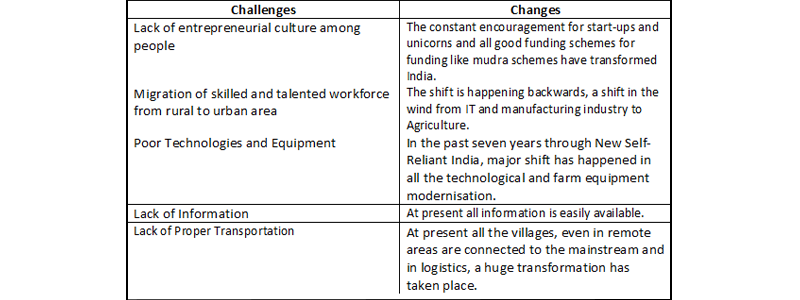
English Transliteration: Suzandrum aerp pinnadhu ulagam enavae Uzhandhum uzavae thalai.
English Translation: Farming though hard is foremost trade; Men ply at will but ploughmen lead.
Meaning: Though people in the world are engaged in so many avocations, since they all depend on the farmers, farming is the prime and important vocation in the world. (Kural 1031)
There are 84 Lakh species in the Universe, one such specimen is human being with sixth sense. Taking the world population as 760 crore and India population as 130 crores, all the mouth to be fed. Hence, Food and Water are the basic needs for survival. The requirements are increasing always, and hence with 65% of population living in rural India, and agriculture contributing 25% towards India's GDP, it is very much the need of the hour to discuss about the emerging discipline in Agriculture domain – Agripreneurs.
Agripreneurship is a sustainable, growth-oriented, market-driven concept which opens a newer threshold, combining both agriculture and entrepreneurial activities, which makes an individual self-reliant. In India, there are six lakh villages, 70% of the population living in rural, approx. 89 crores, and 58% depend on agriculture for living, it includes farming, forestry, and fishing. The Indian Council of Agricultural Research (ICAR), the main regulator of agricultural education, recognises three "Central Agricultural Universities", four Deemed Universities and 63 "State Agricultural Universities".
Farmers work for their living, based on the demand for the Minimum Support Price. In contrast, Agripreneurs (Agriculture + Entrepreneurship), predefine their role, work with self-confidence to market agricultural products by educating and creating a demand, take risks and adopt sustainability as their mantra to achieve success.
Farmers are working in the agricultural field, to produce the food grains or other farmproducts. While Agripreneurs work in the farmlands primarily, they create a wide market for their produce with their talent and network, and thus work in a more professional way with their planned approach.
The Old Order Changeth
Yielding place to new - Alfred Lord Tennyson
There is a shift in the mindset of young minds, in the sense, from working in a manufacturing or IT firm, towards working in farm fields. Young engineers in India are quitting their flourishing careers in MNCs, ditching their business suits, and opting for farming as a profession. Most of them are of the opinion that it wasn’t the lack of jobs, but the search for a more sustainable lifestyle that prompted the move.
Goa-based Ajay Naik was bothered by the steady deterioration in the quality of vegetables and after a lot of research launched Letcetra Agritech — India’s first indoor vertical hydroponics farm that uses nutrient-rich water rather than soil. Vishal Shaukeen, who is also an engineer, studied and set up a polyhouse, a greenhouse made from polythene, last year on his own. Pramod, a former automobile engineer who switched to farming in 2006, and now gets a yearly turnover of a crore, after implementing a radically different method of cultivation. In 2006, after feeling unsatisfied in his job as an automobile engineer, Pramod abandoned engineering and decided to give farming an earnest shot on his 26-acre ancestral farming land. In 2007-08, he switched wholly to horticulture, planted oranges, guavas, lemons, sweet limes, raw bananas and toor dal, and decided to start his own mill. He sells the processed and unpolished pulses under the brand name of ‘Vandana’ and has an annual turnover of about Rs. 1 crore from his dal mill and an additional Rs 10-12 lakh from horticulture, which is much more than what he was earning as an engineer.
Sachin Kale is a mechanical engineer from Nagpur who started his career by working at a power plant and rapidly rose to the top over the years. In 2013, Sachin left his luxurious life in Gurgaon, where he was working as a manager for Punj Lloyd and getting a hefty salary of Rs 24 lakh per annum. He shifted to Medhpar to become a farmer. He invested his 15-year-old provident fund in setting up a clean energy model where his farm was useful all year round and gave a maximum of profit. In 2014, he launched his own company, Innovative AgriLife Solutions Pvt. Ltd., which helped farmers with the contract farming model. Today, Sachin’s company is helping 137 happy farmers working on 200 acres of land and drawing a turnover of approximately Rs 2 crore.
Another engineer, Harish left his government job to take up Aloe Vera farming in Rajasthan – which proved highly successful, earning him crores. Once he decided to farm on his ancestral land in Jaisalmer, one of the first things that Harish did was to get his soil tested by the agricultural department.
Harish’s initial 80,000 saplings quickly grew in number to seven lakhs. Within six months Harish managed to get ten clients for his Aloe Vera within Rajasthan itself. But soon discovered that they, in turn, were selling the extracted pulp at much higher prices. So, he trained his farm labourers to extract the pulp, giving them all some extra income.
Rajiv is a part-time Chartered Accountant and a full-time farmer. And according to him, he earns more from farming than his chartered accountancy firm. After his three-year-old daughter refused to mingle with farmers during one of his visits to his ancestral village, he decided to take up farming to change her views. His first step was to lease some land in Kuchu village, 32 kms away from Ranchi. As he did not have the funds to pay rent for the land, he offered the landlord 1/3rd of the produce he grew. And thus, his journey into agriculture began. He made use of the latest technology, like drip irrigation and mulching, to get a maximum yield at his farm. In 2014, he had a good harvest of watermelon and muskmelon. But the profit did not do justice to the investment. He then divided the land into small segments and calculated the investment made, labour cost, and the profit gained from each part. This gave him a clear idea of the economics of the farm. He planted different crops in each segment to calculate the exact ‘investment versus profit’ ratio of each harvest. This helped him to decide what crops should be planted next and has now taken 32 acres of farm on lease and is growing brinjal, cucumber, watermelon, muskmelon, and tomato and earns a profit of around Rs 15 to 16 lakh every year.
Agripreneurs contribute to the National Economy:
Agripreneurs plays a major role in the growth and development of national economy through entrepreneurship development which increases the income level and employment opportunities in rural as well as urban areas. They help in inducing productivity gains by smallholder farmers and integrating them into local, national, and international markets and help in reducing food costs, supply uncertainties and improving the diets of the rural and urban poor in the country. They also generate growth, increasing and diversifying income, and providing entrepreneurial opportunities in both rural and urban areas.
Agripreneurs associate themselves in the following nomenclature:
Farm Level Producers: At the individual family point every family is to be treated as venture, to enhance the production by making best use of the technology, possessions, and demand in the market.
Service Providers: For optimising agriculture by every family business, there are diverse types of services requisites at the village level. These include the input borrowing and distribution, hiring of equipment like tractors, sprayers, seed drills, threshers, harvests.
Input Producers: Agripreneurs produce and supply inputs which can be produced by the home entrepreneurs at the village level such as biopesticides, soil amendments, biofertilizers, vermicompost, plants of diverse species of vegetables, fruits, ornamentals, root media for raising plants in pots, production of cattle feed concentrate, agricultural tools, irrigation accessories, mineral mixture, and complete feed. There are good openings to support, fishery, sericulture, and poultry as well, during sponsorship of critical service amenities in rural areas.
Processing and Marketing of Farm Produce: Well-organized management of post- production processes requires higher level of knowledge as well as investment. Such venture can be handled by the Agripreneurs.
Agro Produce processing units: These units do not manufacture any new product. They merely process the agricultural products e.g., Rice mills, Dal mills, decorticating mills etc.
Agro Produce manufacturing units: These units produce entirely new products based on the agricultural products as the main raw material. e.g., Sugar factories, Bakery, Straw board units etc.
Agro-inputs manufacturing units: These units produce goods either for mechanisation of agriculture or for increasing manufacturing plants, e.g., Fertilizer production units, food processing units, agricultural implements etc.
Agro service centres: These include the workshops and service centre for repairing and serving the agricultural implement used in agriculture.
Women-Agripreneurs a way forward: Agripreneurship among women is a major agenda of government for better balancing in the society and women empowerment. The foremost thing needed to be done is land entitlement on the name of female members of the household, so that women will form, Self Help Groups, marketing of farm produce and help small traders through micro finance.
Challenges and Changes Implemented:

Development of Agripreneurship and the Future for Agripreneurs in India
Key Observations:
- Every State/UT and each district, taluks should promote entrepreneurial culture on a war footing basis among the people in rural areas and create a vibrant environment for the rural development identifying promising agricultural and allied areas of business to promote entrepreneurial activity.
- Plan should be made to conduct specific technical training programmes to develop the required technical competency among the potential entrepreneurs.
- A developmental fund should be created to support the start-up process of agripreneurship to establish agricultural incubation centres for the benefit of Agripreneurs.
- Agripreneurs should be given full support in terms of providing financial and marketing assistance.
- Every state government should improve infrastructural setup in rural areas so that a greater number of youths can be brought in and trained as Agripreneurs.
- All agricultural universities must develop entrepreneurial culture among the people in rural area to create a vibrant environment for creating a newer domain of Agripreneurs.
- ICAR and other Agricultural Universities must train the rural youth in entrepreneurship, finance, marketing and cultivate a culture, which will promote and motivate more Agripreneurs.
- The village district centres, and rural development banks must identify the trust areas for agripreneurial development across the stages of value chain of the agricultural process and designing appropriate strategies for the promotion, which will rope in more people to become Agripreneurs.
- The state governments must identify promising agriculture allied areas of business with the help of RRBs and Agricultural Universities to promote entrepreneurial activity and provide area specific technical training programs to develop the required technical competency among the potential Agripreneurs.
- A detailed research plan is necessary to establish a development fund, to support the start-up processes of Agripreneurship and to form agricultural incubation centres.
About the Author
Dr. R Subramanian is the Founder & CEO of MIND BIZ Projects & Training Pvt. Ltd.